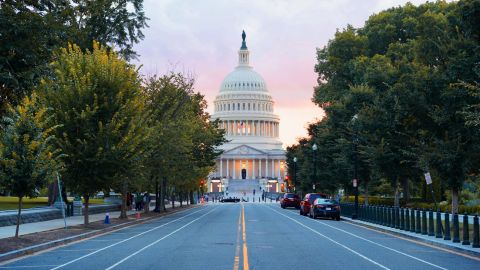A call to action: Urge Congress to support scientific research
Scientists who do basic research need robust funding from key science agencies, primarily the National Institutes of Health, the National Science Foundation and the Department of Energy. And scientists can advocate for this funding.
Congress negotiates and sets budgets across federal agencies every year in what’s known as the appropriation process. These budgets determine how much funding is available for scientific research through agencies such as the NIH and NSF.

Throughout this process, the American Society for Biochemistry and Molecular Biology’s public affairs team and the society’s Public Affairs Advisory Committee advocate for increased funding of research, especially basic research. A key event is the annual ASBMB Capitol Hill Day, where PAAC members meet with lawmakers and their staff in congressional offices in Washington, D.C., to communicate ASBMB members’ need for increased scientific funding.
Ann West is the associate vice president for research and development and a professor at the University of Oklahoma. She leads the ASBMB Public Affairs Advisory Committee.
“Advocating for sustainable funding for scientific research will ensure that the U.S. continues to lead in global R&D, lay the foundation for technology development and train the future generation of STEM scientists,” West said.

However, members of Congress need more than urging from staff and committee members; they need to hear from ASBMB members across the country. So, the society’s advocacy team invites members to email their elected officials during the letter writing campaign to ask for continued funding.
But first, the public affairs team and PAAC members want to make sure members know how the budgeting process works and what the society is asking for.
“We can be the loudest, strongest advocates for science funding,” Sarina Neote, public affairs director of the ASBMB, said. “But we really need ASBMB members to make that case and engage with their policymakers.”
How fiscal year budgets work
The appropriations process starts when the president releases a budget request for the upcoming fiscal year. In March, President Joe Biden’s administration released his budget request for fiscal year 2025, which includes key scientific priorities. (Read the ASBMB’s statement on Biden’s requested budget here).
Congress then starts the long process of negotiating how much subcommittees can allocate for the federal programs under their jurisdiction. The House of Representatives and the Senate each have their own appropriation committees, which each consist of 12 subcommittees that examine budget requests and spending needs for the coming fiscal year.
The 24 appropriations subcommittees hold hearings for federal agencies to discuss budget requests, and organizations are encouraged to submit appropriations testimonies. Ann Stock, president of the ASBMB, submitted testimony in support of the NIH to the Labor, Health and Human Services, Education and Related Agencies subcommittee on May 2.
After examining the budget requests, the House and Senate subcommittees produce 12 appropriation bills to fund the federal government. The appropriations committees make amendments to the bills before sending them to the House and Senate floor for approval.
The two chambers negotiate and reconcile their 12 bills, and the president signs the final versions.
The ASBMB’s budget asks
The ASBMB released a statement on Biden’s budget and NSF funding urging the administration to support sustained and predicable budget increases for federal agencies in fiscal year 2025.
The ASBMB is asking for:
- $51.3 billion for the National Institutes of Health to support its intramural and extramural programs that fuel discovery-based biomedical research.
- $11.9 billion for the National Science Foundation to support its intramural and extramural programs across all scientific disciplines.
- $9 billion for the Department of Energy to support the Office of Science and support the national labs.
Scientific research in the U.S. relies on the funding of these key federal agencies. When Congress finalized the 12 bills for fiscal 2024 on March 23, the NIH’s budget remained flat and NSF faced an 8% budget cut.
“As science policy advocates, we know that these top line budget numbers for federal agencies have a direct impact on the work that individual scientists do at their universities, but we need to amplify that message to Congress,” Neote said.
What you can do
Each congressional office on Capitol Hill depends on constituents, the people who vote for the senator or representative, to inform decisions and votes on legislation — this includes budgets.
Biden has requested $48.6 billion for the NIH in fiscal 2025; this is $920 million more than the agency’s fiscal 2023 budget, or a 1.8% increase. The NIH needs at least a 5% increase for fiscal 2025 to cover the rising cost of science and to ensure scientific progress is not lost and the nation’s biological and biomedical enterprise will thrive.
“ASBMB members can take action and push their policymakers to fund science through our letter writing campaign,” West said. “The more letters that are submitted, the more likely our cause will be heard.”
Write a letter
This week, the public affairs staff and PAAC members urge ASBMB members to participate in the letter writing campaign by clicking on the link and filling out a short form. A generalized email will automatically be sent to the member’s elected officials urging robust funding for research.
Enjoy reading ASBMB Today?
Become a member to receive the print edition four times a year and the digital edition monthly.
Learn moreGet the latest from ASBMB Today
Enter your email address, and we’ll send you a weekly email with recent articles, interviews and more.
Latest in Policy
Policy highlights or most popular articles

Councilors advocate for science on Capitol Hill
ASBMB Councilors meet with their elected officials to advocate for basic scientific research funding and training the next generation of scientists.

Hope for a cure hangs on research
Amid drastic proposed cuts to biomedical research, rare disease families like Hailey Adkisson’s fight for survival and hope. Without funding, science can’t “catch up” to help the patients who need it most.

Supporting science through advocacy and community building
ASBMB calls on scientists to take action as funding cuts and policy shifts threaten the U.S. research enterprise, emphasizing the power of community advocacy and persistence in protecting the future of science.

Seven steps to advocating in your home state
Find out how to schedule, prepare for and conduct a productive district office meeting to communicate the importance of fundamental scientific research funding to your representatives.

ASBMB members call for funding and agency support amidst uncertainty
In 60 meetings on Capitol Hill, scientists urge legislators to reaffirm support for scientific innovation

Embrace your neurodivergence and flourish in college
This guide offers practical advice on setting yourself up for success — learn how to leverage campus resources, work with professors and embrace your strengths.

